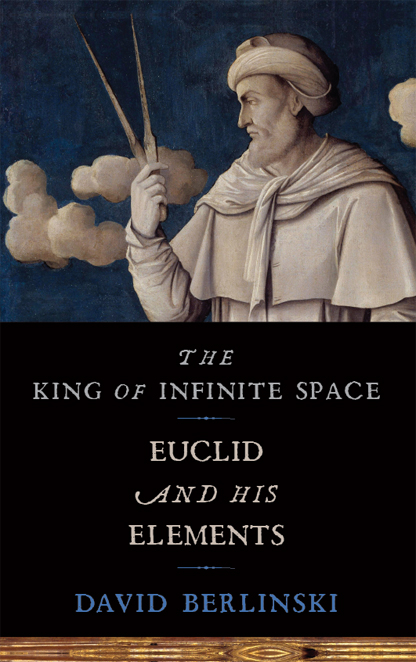
The King of Infinite Space
Euclid and His Elements
کتاب های مرتبط
- اطلاعات
- نقد و بررسی
- دیدگاه کاربران
نقد و بررسی

Starred review from November 12, 2012
In this brief, accessible foray, popular math/science writer Berlinski (Newton’s Gift) breathes life into an ancient mathematician and the world of axioms and theorems he created—a geometric world that became the basis for much of modern math, from analytic geometry to the idea of curved space-time. To Berlinski, Euclid’s fourth-century B.C., 13-volume Elements is a manifestation of his “intense demand for an idealized world.” In small, precise steps, Euclid spells out five axioms, or assumptions, about points, lines, and angles, and what it means when two things are “equal”—everything needed to describe shapes in space. Berlinski writes, “In every generation, a few students have found themselves ravished by the Elements”; so too will even the most math-averse be enthralled by Berlinski’s rich, vibrant language: Euclid’s “shady” fifth axiom, concerning parallel lines, is “the little lunatic locked in a padded cell,” “all mad glitter and glow”; equilateral triangles are “squat brutes” that “do nothing and go nowhere,” while isosceles triangles “have the power to soar.” Berlinski’s book succeeds not only as a history of geometry but also as an exploration of the power of ideas, masterfully replacing cold abstraction with humor and humanity. 13 b&w images. Agent: Susan Ginsburg, Writers House.

December 1, 2012
A playful yet deep excursus through Euclid's Elements, from veteran mathematician Berlinski (One, Two, Three: Absolutely Elementary Mathematics, 2011, etc.). It is a pleasure to follow the author as he grasps the logistical tail of Euclid's mathematics and follows it to this day. He delves into the trials of the Beltrami pseudosphere, the hyperbolic triangle, the Poincare disk and the Erlangen Program and its classification of different kinds of geometry. It is a profound investigation, as math was synthesized and refined and Euclid broke out with his axiomatic system ("composed of small, mincing, but precise and delicate, logical steps") as a way of seeing, a way of life. He fashioned an axiomatic organization that stylized abstraction to devise all the propositions of geometry via a handful of theories. The first four books of the Elements ("by far and away the most successful of mathematical textbooks") are the pivots, but the drama comes from the simple waxing complexity of the formulations, especially the fifth, where discomfort sets in. Euclid may not have been happy with these interrogations of his common notions, axis, proof and theorems, but Euclidean geometry lasted for 2,000 years. Nearly a third of the book tackles the parallel postulate and the coming of analytic geometry, with David Hilbert's brainstorms being critical referents. Berklinski also provides a list of Euclid's definitions (e.g., "A point is that which has no part"). The author's storytelling is clear, crisp and emotive, and he brings Euclid's little-known life alive.
COPYRIGHT(2012) Kirkus Reviews, ALL RIGHTS RESERVED.

April 15, 2013
Berlinski (Infinite Ascent: A Short History of Mathematics) has written a number of books on math, science, philosophy, and related topics. His new book is a tribute to the classical Greek mathematician whose treatment of the fundamentals of geometry, his Elements, has been studied (with pleasure or anguish) by millions over the past 2,000-plus years. Berlinski obviously savors the work of Euclid, but he finds room for quibbles with what he considers the fuzziness of Euclid's axioms and definitions. His side remarks are often humorous (a welcome and unusual touch in a book dedicated to an analysis of an ancient mathematical treatise). He also flavors his discussion with quotes from mathematicians of more recent centuries. In particular he tells of the 19th-century mathematicians who were brave enough to develop non-Euclidean geometries that violate Euclid's fifth axiom. VERDICT Berlinski has produced a volume that will entertain and enlighten many of today's readers--even those who do not treasure their memories of geometry class.--Jack W. Weigel, formerly with Univ. of Michigan Lib., Ann Arbor
Copyright 2013 Library Journal, LLC Used with permission.

Starred review from January 1, 2013
As dazzling as first love is how Bertrand Russell described his initial encounter with Euclid. As a mathematician who understands what Russell felt, Berlinski guides his readers through the intellectual wonderland that the ancient Greek geometer created in his epoch-making treatise, the Elements. In writing at once geometrically precise and disarmingly conversational, Berlinski explores the imposing edifice that Euclid erected on a foundation of just five deceptively simple axioms. Each of these axioms receives careful scrutiny, allowing readers to share in the excitement of mapping out the dimensions of an audacious new human enterprise, inscribing sharp boundaries around key concepts yet opening onto the infinite. Only an author who thinks both mathematically and philosophically could inferas Berlinski doesthe intellectual and even moral substance of the mental perspective that Euclid unfolds. Readers thus come to realize how Euclid's pioneering thought made possible the rigor of a mathematical proofand the discipline of a mathematical life. Even in the revolutionary modern theorizing of non-Euclidian geometers such as Lobachevsky, Bolyai, and Poincar', readers will discern Euclid's abiding influence as a visionary who glimpsed the mathematical unities hidden beneath chaotic appearances. An impressively concise distillation of the wizardry that transforms points, lines, and planes into sheer genius.(Reprinted with permission of Booklist, copyright 2013, American Library Association.)

























دیدگاه کاربران